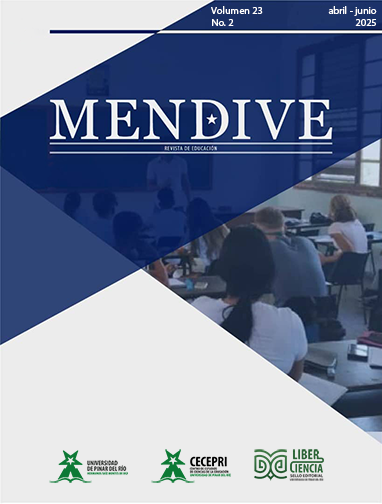The preparation for the extension work of the teachers of the Municipal University Center: diagnosis
Main Article Content
Abstract
This article presents the results of a study on teachers' preparation for extension work, a topic of high relevance in the current context due to its connection to the economic and social development of local communities. The study was conducted at the Municipal University Center (CUM) in San Luis, with the objective of diagnosing the current state of such preparation. Theoretical methods such as historical-logical analysis, induction-deduction, and analysis-synthesis were used, as well as empirical methods such as documentary analysis, surveys, interviews, and observation of methodological activities. Descriptive statistics were used for data processing. The main findings reveal limited teacher preparation for extension work, characterized by isolated actions, poorly integrated into the socio-community context, and with a focus on specific activities rather than on ongoing training processes. Likewise, a low recognition of the value of university extension in the development of values and attitudes committed to social transformation was observed, which compromises the comprehensiveness of the process. A weak appreciation was also identified among professors and administrators regarding the role of extension in the development of critical and transformative professional skills. In conclusion, there are evident deficiencies, both theoretical and practical, in the extension training of teachers, especially in methodological aspects. These results underscore the need to refine the training process to ensure more committed, contextualized, and transformative performance by university professors.
Downloads
Article Details

This work is licensed under a Creative Commons Attribution-NonCommercial 4.0 International License.
References
Cano Menoni, A., & Flores, M. G. (2023). Tendencias de la Extensión Universitaria en América Latina: Chile, México, Uruguay y redes regionales. InterCambios, 10(1), e0005.
Ferrero de Roqué, M. T., & Occelli, M. (2019). Las prácticas educativas extensionistas II: un desafío de la formación superior. Boletín Biológica, 42 (2), 52-73. http://hdl.handle.net/11336/129891
García González, E., & Falcón Pi, G. (2020). Aprender la extensión universitaria. Serie Científica De La Universidad De Las Ciencias Informáticas, 12(12), 80-91. https://publicaciones.uci.cu/index.php/serie/article/view/526
García González, M., Ortiz Cárdenas, T., García Rodríguez, A., & Fernández García, R. H. (2019). Acquisition of Core Principalship Competencies at Universities through Groups and Extension. Revista Cubana de Educación Superior, 38(1), e15. http://scielo.sld.cu/scielo.php?script=sci_arttext&pid=S0257-43142019000100015&lng=es&tlng=en
González Aportela, O., Batista Mainegra, A., Rial Blanco, R. M., & Imbert Mayola, J. C. (2021). Proyecto extensionista de protagonismo estudiantil en el movimiento cultural universitario. Universidad y Sociedad, 13(2), 204-216. http://scielo.sld.cu/scielo.php?script=sci_arttext&pid=S2218-36202021000200204&lng=es&tlng=en
González Fernández-Larrea, M., González González, G. R., González Aportela, O., & Batista Mainegra, A. (2021). Educación y sociedad: universidad, extensión universitaria y comunidad. Revista Cubana de Educación Superior, 40(Supl. 1). http://scielo.sld.cu/scielo.php?script=sci_arttext&pid=S0257-43142021000400020&lng=es&tlng=es
González Fernández-Larrea, M., & González González, G. R. (2002). Gestión de la extensión universitaria: una aproximación desde la perspectiva cubana. Revista Cubana de Educación Superior. https://dialnet.unirioja.es/servlet/articulo?codigo=2460644
Jiménez Morejón, A., Pulido Díaz, A., Silva López, M., & Estévez Estévez, Z. (2022). Fundamentos para la gestión del movimiento de artistas aficionados. Contribución a la formación del profesional. Revista Cubana de Educación Superior, 41(3), 10. http://scielo.sld.cu/scielo.php?script=sci_arttext&pid=S0257-43142022000300010&lng=es&tlng=es
Landini, F. P. (2022). Propuestas de extensionistas de Argentina, Chile, Cuba, Ecuador, Guatemala y Uruguay para fortalecer su propia formación. Revista Brasileira de Educação do Campo; 7(12), 1-29. https://ri.conicet.gov.ar/handle/11336/218375
Rojas Valdés, A., González Fernández, M. & Martínez Hernández, A. (2018). Concepción pedagógica del proceso de formación para la gestión de la extensión universitaria en el año académico. Universidad y Sociedad, 10(3), 349-359. http://scielo.sld.cu/scielo.php?script=sci_arttext&pid=S2218-36202018000300349&lng=es&tlng=es
Taborda, P. E. (2010). La formación académica del estudiante extensionista desde el diseño curricular. Extensión En Red, (1). http://www.perio.unlp.edu.ar/ojs/index.php/extensionenred/article/view/47
Tommasino, H. & Cano, A. (2016). Modelos de extensión universitaria en las universidades latinoamericanas en el siglo XXI: tendencias y controversias. Universidades, 67(enero-marzo), 7-24. https://udualerreu.org/index.php/universidades/article/view/395
Valenzuela Tovar, S. M. (2018). Unión Latinoamericana de Extensión Universitaria: un espacio de cooperación, intercambio y reflexión en materia de extensión y vinculación con la sociedad. Revista de Extensión Universitaria +E, 8(enero-junio), 61-88. https://www.redalyc.org/pdf/5641/564172837006.pdf
Vento Ruizcalderón, M., & Ordaz Hernández, M. (2019). La formación en la Universidad de promotores de estilos de vida saludables. Revista de la Universidad de Ciencias Médicas de Pinar del Río, 23(6). https://www.revcmpinar.sld.cu/index.php/publicaciones/article/view/4141


